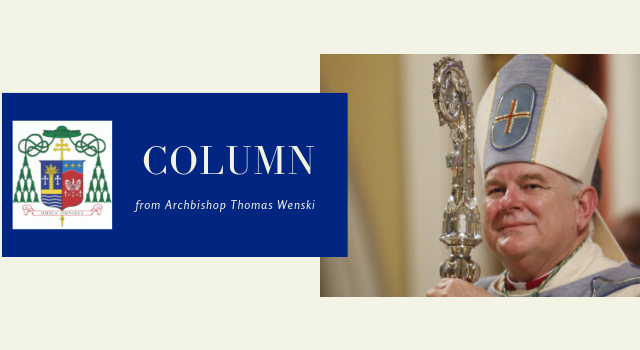By Archbishop Thomas Wenski - The Archdiocese of Miami
In the 17 years since the Boston Globe broke the story of the clergy sex abuse scandal there has been no shortage of brutally unfavorable — and oftentimes patently unfair — media coverage of the Catholic Church. Some, of course, feel that the Catholic Church is getting a rightly deserved comeuppance for its past failures to effectively address the question of child sexual abuse in its midst. But such Schadenfreude does very little to recognize the steps that have been taken in the Catholic Church to prevent future occurrences.
Today, humbled by its failure to act earlier and more decisively against predators in its midst, the Catholic Church has paid a high price — not merely because of financial payouts but in its ability to confidently preach the Gospel because of the loss of credibility in the broader society. And, of course, the victims have paid an even higher price: loss of innocence, self-destructive behaviors induced by shame or anger, as well as the pain of often not being believed by loved ones. They need to be told repeatedly that what happened to them was not their fault.
Since the Dallas Charter of 2002, the U.S. Catholic Church is leading the way today in assuring the protection of minors. All Church employees and volunteers — and not just clergy — who work with minors are fingerprinted and their backgrounds checked. Child safety programs have been implemented in our schools and youth programs. In 2018, in the US, some 2,531,720 people — both clergy and lay —underwent child safety training for work in parishes. Also, more than 2,515,411 adults working directly with children in the Catholic Church submitted to background checks. Each US diocese has a victims’ assistance coordinator. All accusations are immediately reported to the civil authorities. No other institution in American society today has the protection of minors as a higher priority.
While some victims may be understandably mistrustful, undeniable progress has been made by Catholic dioceses throughout the U.S. Philip Jenkins, the Penn State professor and expert on the sexual abuse of young people (and a non-Catholic) states: “Since definitely the late ‘80s and early ‘90s, most Catholic dioceses really developed very stringent policies and very, very few cases are coming to light from after 1990.”
Even last year’s Pennsylvania Grand Jury report indicated as much. That is not to say what it revealed about historic cases (pre-2002) and the bishops’ failure then to forthrightly address this scandal did not deserve the anger and disgust of people both inside and outside of the Church. Nevertheless, zero tolerance adopted by the bishops in Dallas in 2002 continues in force: those credibly accused are permanently removed from ministry. Thankfully the instances of predation by Catholic priests have markedly decreased as the annual audits of our Child Protection Protocols show. Better training and better screening of those admitted to the priesthood are among the factors that explain this hopeful, and positive, trend.
Nevertheless, it has become difficult for many thousands of the faithful — laity and clergy alike — to fully own our Catholic identity among family and friends (especially among those who already have an axe to grind with the Church). Yet, what really inspires and heals, restoring trust and reminding people of the joy of discipleship, is the call to belong to Christ and his Church. The real work of the Church goes on: in our parishes, in our schools and catechism classes, in our service programs, in our youth programs and chaplaincies, and in our seminaries and convents. People are welcomed daily and inspired by the beauty of the Church’s tradition and sacramental life.
While the failures of the few, yet always too many, remind us of the reality of sin and do constitute a real stumbling block for many, there are not lacking examples of genuine holiness among the members of the Body of Christ. The Church has weathered hurricanes of scandal in the past and come through renewed. Christ’s promise that the “gates of hell shall not prevail” against his Church (Matthew 16:18) points us to hope.
But no system is perfect — and so, we will always have to be vigilant. The past is the past — we cannot change it; but we have learned from it and are changing the future. The 2002 Dallas Charter is our pledge that Catholic Church leaders remain very serious about protecting the young from sexual abuse.

